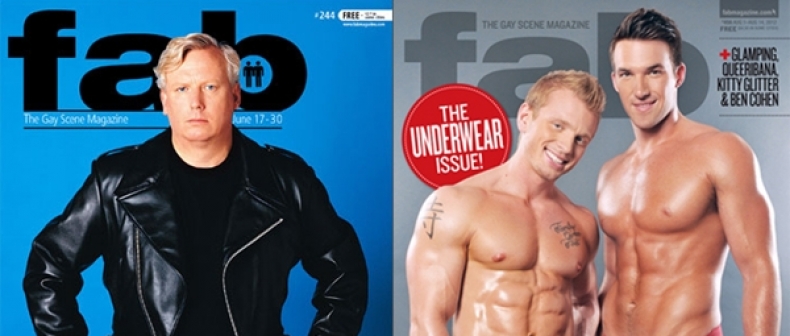
Earlier this week, it was announced that Fab, Toronto’s “gay scene magazine,” would cease publication with a final issue on April 25, just shy of 20 years on our streets. Fab, like many of its newsstand comrades, had become a financial casualty, and publisher Brandon Matheson cites declining advertising revenue and readership as plot points in this demise. The social condolences were immediate, spirited; the loss, a real one. There was no real outcry, though, as there often is when something gay feels wrong. After all, Pink Triangle Press, the company that purchased the magazine in 2008 and also owns Xtra!, the national gay biweekly, had brought the end upon itself. Still, readers of any publication understand the realities of “harsh economic times” and “changing [media] realities” — it makes them sympathetic. This also makes readers nostalgic. For gays, the news feels a bit more personal, almost like a silent affirmation that assimilation is very real, as our identities as gay men and women become less confined to, or by, being gay men and women.
This is not a eulogy. It is an understanding. But what could I say that hasn’t already been said? I don’t know where to begin, but I know when. Growing up in the city, I often find myself in the chorus of unpopular opinions. I had the Internet before I found the Village, and I had Edmund White before I knew of any gay city-centric print. I had the freedom of Toronto above all else. Fab has never represented me, and thus it does not represent some sort of cornerstone of my gay youth. It holds no special “place in my heart.” Unlike many who lament the closing of such an “iconic” gay publication, Fab was never that publication for me. After all, it was the MSN Chat that shaped my future and allowed me to slip comfortably into my sexuality at my own pace, to find my way to a space I felt okay about occupying within. The problem with Fab, I found, was that it was always aspirational in the wrong ways (body issues, diversity!), in ways far more damaging than wanting, say $1,000 shoes in Details.
Fab meant well, I’m sure, but its content almost always read as one-note, superficial and exhausting. It was marginally interested in the outside world, unapologetically over-sexualized and objectified, too much fun to be, or even care about being, taken seriously. I found Fab reductive of the “gay lifestyle,” even demeaning to the developments of “the cause.” It was bound by affectations of some singular supposed gay experience, by what being gay should mean and feel like, relaying images that, largely, many of us would never be. I soon found the Fab of the 2000s embarrassing and infuriating because I was told it was supposed to represent me, and that I should blindly believe in its message just because, or else. The magazine — or its editors, rather — read as if it was never too concerned with the ways it was problematic because it was all fun and glam and cheeky, and the sprinkling of daring, important stories were enough to hold its merit as something that mattered. Surely, I thought, there’s got to be more to being gay than hot guys and event listings, presumably to meet other hot guys. (Think reading Playboy for the articles.)
And then Phil Villeneuve happened. Originally hired on as a music columnist, Villeneuve took over as Fab‘s editor in 2012 with a tone that was endearing and electrifying. His Fab was a Fab I found myself almost able to care about. He spearheaded a splashy new design aesthetic, modernizing the visual. He imported a history column to school those who take our history for granted. He brought in more diversity, in all ways, than I had ever seen in a decade of reading. He expected something more, something intelligent for, and from, its readership.
Until Villeneuve’s leadership, Fab suffered sorely from its preoccupation with the way the “scene” was, not the way the scene was changing, blending, disappearing, greying. Villeneuve’s attempt at making his Fab accessible to new hoards of homos — who, largely, probably, did not identify with the community for which the mag was originally created — were not in vain. The more Villeneuve attempted to bring the pub into 2013 along with its ever-evolving cohorts, the more I found myself with renewed faith in the power and voice of this publication, of what it could probably represent for a new era within the community and its melting boundaries beyond the Gay Ghetto. He made Fab “cool” again because of his approach from the outside-in, an allegiance to the city before the Village.
Yet, his new direction felt restrained and resisted, and while Fab’s columnists flourished, its feature stories always stopped short of any sort of epiphany. Readers noticed, I noticed, but readers pushed back. (I remember one issue, for example, in the front of book letters, a reader accused Villeneuve of hiring his west-end gay friends to the detriment of the spirit of Fab.) And when Villeneuve is quoted as referring to Fab as “Xtra’s little sloppy and drunk party-girl sister who just wants to talk about underwear and shoes,” I’m reminded of why the change felt fruitless, and why, while I wanted to understand this new Fab and its courage to be some sort of “modern gay,” I always found myself asking, so what? Maybe, just maybe, we needed more compelling stories across the LGBT spectrum and less fluff pieces on “sexy” beards? Everything good about Fab is that it, well, looked good, and that was also its own worst enemy, often favouring style and sex over any sort of palpable substance.
Still, the closure is crazy news, isn’t it? When you read about the tiny LGBT mag that could in your morning Metro paper, and you see the news covered everywhere from Toronto Star to industry watchdog Masthead Online to blogs in the US , you know this is a big fucking deal to a lot of people. I won’t refute the belief that Fab‘s closure is a significant loss to the industry-at-large and the city itself, if only as physical, quantitive proof of a liberated, powerful gay community. As a friend of mine noted, there is a sort of comfort in knowing that a publication like Fab existed. It was a mirror that served as a reflection to prove we’re as alive and thriving as ever, even in our club love, and even if the hallmark spirit of places like the Church/Wellesley Village is in constant threat. A lot of the rose-coloured nostalgia seems to nod in the glory days of first starts in the biz, when Fab actually attempted to matter in the days of cover stars like former mayor David Miller in leatherwear, or Olivia Chow and Jack Layton with a mountie (in leatherwear!), or even former police chief Julian Fantino with “The Village People.” A lot of people feel sorry, or upset, but how many of them did anything to support the mag? How many of you were regular readers, anyway?
I really do find myself at a loss for words, not feelings, because I have no desire to romanticize Fab. I mean, what has Fab ever done for me? Perhaps that is the wrong, most selfish question I could ask. But if it was created for men like me, for audiences like me, then I have a right to hold fast to my expectations of what I want from a publication that presumes to speak for a community that, for better or for worse, I am allied with for life. As something that was supposed to be a barometer for gay culture and expression, time and again, Fab failed to reflect the rapidly-evolving gay that didn’t need the forefathers’ approval. Fab became a publication, by way of conditioning, that I came to “hate read” because it was the thing that I was supposed to read, like the Village was a place I was supposed to go, to belong. I’m left here, in the days following this announcement, trying to understand my relationship with something that I will miss, but also held in such contempt.
Again, what can I say that you wouldn’t hate me for saying, for offending? Except, perhaps, that it time to accept that the gay times, they are a changin’. Villeneuve wrote in his most recent editor’s letter: “All this being said, Xtra isn’t going anywhere. In fact, later this year PTP will launch a new website called dailyxtra.com, which will replace xtra.ca. Daily Xtra will incorporate much of Fab’s online content and will have increased coverage of the queer travel market.” I can think of no better opportunity to create a popular publication that more wholly and comprehensively explores the community with the style and sex of Fab combined with the astute, dedicated reporting of Xtra staffers. A gay superpower, for Toronto and beyond.
Nevertheless, I will mourn this loss in ways we’re expected, or told to, mourn things that, while connected to the city’s gay ancestry, are not inherently a part of us personally. I mourn an opportunity taken, but thwarted. I will mourn what could have been. I will mourn the benefit of the doubt. I mourn even more for fellow columnists who are trying to produce great work “in this climate.” You don’t know what you’ve got until it’s gone, they say. But what is it that we’re really missing? Fab magazine is a legacy, even if it’s not my legacy, and was instrumental to someone, somewhere on their paths to queerdom. And for that, I pay my respects.
This is not good riddance, it is merely good luck.
____
Paul Aguirre-Livingston is a Toronto-based writer and columnist for The Grid. Find him on Twitter or online.
For more, follow us on Twitter @TorontoStandard and subscribe to our newsletter.














